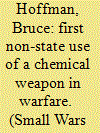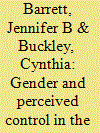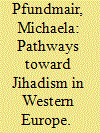|
|
|
Sort Order |
|
|
|
Items / Page
|
|
|
|
|
|
|
| Srl | Item |
| 1 |
ID:
092304


|
|
|
|
|
| Publication |
2009.
|
| Summary/Abstract |
This article presents research conducted by the author in Sri Lanka to verify the first non-state use of a chemical weapon in warfare. This 1990 incident involved a primitive chemical attack perpetrated by the Liberation Tigers of Tamil Eelam (the LTTE or Tamil Tigers) on a Sri Lankan Armed Forces (SLAF) encampment in East Kiran, in the Batticaloa district of Sri Lanka. The article first describes the incident itself, before providing a brief description of the LTTE, its background, and the influence of its leader, Velupillai Prabhakaran. The article then analyzes the attack and places it within the context of theories about potential terrorist and insurgent use of unconventional weapons, such as chemical warfare agents. The research reported here is of interest not only because of the unique, opportunistic dimension of the attack, but also because its conclusions challenge the conventional wisdom about likely terrorist and insurgent use of these unconventional weapons and sheds new light on their interest and intentions in employing such weapons and tactics.
|
|
|
|
|
|
|
|
|
|
|
|
|
|
|
|
| 2 |
ID:
086235


|
|
|
|
|
| Publication |
2009.
|
| Summary/Abstract |
The consequences of the socioeconomic transition for male physical health in Russia are widely documented, but much less research examines psychological well-being and mental outlook, or how these outcomes differ for men and women in Russia. Exploring gender differences in personal control, an important aspect of psychological well-being, we find that, controlling for social and economic factors, Russian women report lower levels of control than men. Gender differences in the social determinants of perceived control highlight the importance of gender roles for understanding psychological stress and inform how social expectations differentially influence men's and women's paths to well-being in Russia.
|
|
|
|
|
|
|
|
|
|
|
|
|
|
|
|
| 3 |
ID:
188022


|
|
|
|
|
| Summary/Abstract |
Islamist terror is one of the most terrifying threats worldwide. However, there is no common model about the mechanisms underlying the complex process of radicalization and research is usually undermined by a lack of empirical data. Therefore, we aimed to compose a comprehensive model of radicalization, and test it empirically collecting and analyzing data on Islamist radicals in Western Europe. In Study 1, police professionals assessed seventy-five subjects under investigation for being in the process of radicalization. In Study 2, data from open source news articles about eighty six radical Muslims were evaluated by psychologists. Specific individual preconditions including young age, male gender, migration background, and biographical cuts were consistently found among radicals. Fueling the actual radicalization process, a gradual increase of individual, group and catalyst processes was observed from early (Study 1) to late stages of radicalization (Study 2). These included pursuing individual needs (transcendence, significance, self-esteem, control); processes in the course of a strong group commitment (group identification, prejudice, polarization, perceived group threat, collective emotions, informative influence); and cognitive adaptions to get increasingly comfortable with applying violence (desensitization, dehumanization). The current work may be a solid basis for further empirical investigations and for creating means of prevention and deradicalization.
|
|
|
|
|
|
|
|
|
|
|
|
|
|
|
|
| 4 |
ID:
140402


|
|
|
|
|
| Summary/Abstract |
This article proposes a new theory of false optimism as a cause of war. Named for its similarity to the winner's curse in auctions, this theory explains how and why established sources of misperception (cognitive, psychological, bureaucratic, and organizational) interact with the selection of one military strategy from a set of alternatives to produce a surprising amount of additional false optimism. Even if a state's general perceptions of how well it will fare in a potential war are not biased toward optimism, this theory explains why its perceptions of the particular strategy on which it will base its plans for fighting that war will be systematically biased toward optimism. Simulations and formal modeling confirm the logic of the theory and suggest that the strategist's curse can sharply increase the probability of war due to false optimism.
|
|
|
|
|
|
|
|
|
|
|
|
|
|
|
|
|
|
|
|
|